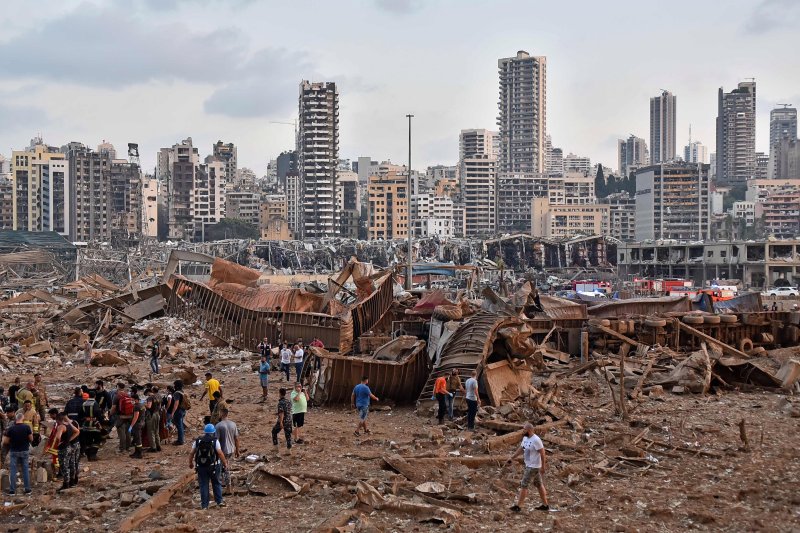
By Dario Sabaghi — al-monitor.com — The blast at Beirut Port on Aug. 4, 2020, not only left more than 215 dead and 6,000 injured, but also changed the skyline of Lebanon’s capital. For many Lebanese, the ruined grain silos are a memorial for the blast’s victims and a testament to the negligence of their political establishment. The forensic investigation was halted for the fifth time in February 2022. No one has yet been held accountable almost two years after the explosion of 552 tonnes of ammonium nitrate. On April 14, 2022, the Lebanese government approved plans to demolish the grain silos.
Lebanese Information Minister Ziad Makari told the local media that the government had appointed the Council for Development and Reconstruction to oversee the demolition process. He did not specify a time frame. Makari said that the government made the decision based on a report by Lebanon’s Khatib and Alami Engineering Company, which warned that the silos might collapse within months and that it would be too expensive to repair them. Culture Minister Mohamed Mortada told Reuters the government had decided to demolish the silos and build new ones based on a “purely economic assessment” of Lebanon’s food security needs, including wheat storage.
The country, whose economy has been melting down since late 2019, is struggling with global grain shortages resulting from the Russian war in Ukraine, from where Lebanon imports most of its wheat. But the families of the Beirut blast victims and activists are fighting the plans, saying there is no reason to demolish the silos now. Mariana Fadoulian, who lost her sister Gaia in the explosion, is the spokesperson for the association of families of Beirut blast victims. She told Al-Monitor that the association wants to keep the silos as a memorial and says the renovation of the port must wait for justice to be served. “Why does the government want to remove the silos if it has no plans to rebuild the port? I think they want to get funds from international donors to remove the damaged silos before the elections and as often happens in Lebanon, profit from the material recovered from the silos,” she said.
Lebanese architect Carlos Moubarak, who created a conceptual proposal to build a memorial park surrounding the silos, told Al-Monitor the silos are a testament to the scale of the blast. “This is a scandalous decision. Everybody knows that silos have become part of our country’s collective memory. This is not a decision that an interim government should make. The decision has to be made by the people and after a public debate,” he said. The fight to preserve the silos damaged by the blast started in March 2022, when the activist group Beirut Urban Declaration Initiative filed a petition calling on the government to stop planning to demolish the grain silos after Economy Minister Amin Salam revealed in February 2022 the government’s intention to destroy the silos in order to construct new ones.
The English edition of the local newspaper L’Orient-Le Jour reported that Public Works Minister Ali Hamieh received a letter on March 1 from Judge Tarek Bitar, the leading investigator of the Beirut blast, noting that the grain silos’ remains were no longer needed in the forensic investigation. On March 16, the government approved initial plans to demolish the silos but on March 18, Mortada declared the structures to be historic architecture and forbade “any action that would change their current status without the prior approval of the Culture Ministry.” However, the government later reversed Mortada’s move and pushed the demolition forward April 14. That day, around 30 relatives of the blast victims gathered near the port to protest the demolition plan. According to an independent report by Swiss company Amann Engineering, the government’s claims of urgency aren’t supported.
The report’s findings show that while the building’s north block facing the sea is heavily damaged and tilting, the south block facing the city is more stable. It explained that although the silos cannot be restored or repaired, new ones cannot be built on the same site as the government aims to do, reading, “The explosion has shattered the concrete piles on which the silos are built, and for technical reasons, it is not possible to drive new piles in between the shattered ones.” The report also says that if Lebanese stakeholders decided to keep the building as a memorial, it will need constant monitoring and access must be restricted from the general public as the silos will collapse eventually. “The decision to demolish the silos is quite suspect as there is no urgency. … The only action that they could make now is creating a safety perimeter around the silos,” Moubarak said.
According to Fadoulian, the Khatib and Alami report does not say that there is an urgent need to demolish the silos. Although Al-Monitor contacted Khatib and Alami several times, the contents of its report couldn’t be verified independently. Moubarak feels that the government used Bitar’s letter to justify its decision to demolish them. “This is a cultural battle between those who don’t want to forget the blast and the political establishment that wants people to forget what happened because it is responsible for what happened,” adding that the memorial, in its own way, serves the course of justice. “It is a way to serve justice by honoring the blast victims and reflecting on this tragic event in the history of this country.” “For all the families of the victims, the silos are the only real way to remember what happened on Aug. 4, 2020, and they will continue to remind us not only of the victims but also the lack of accountability for who is responsible for the tragedy,” Faudolian said.
Read more: https://www.al-monitor.com/originals/2022/04/beirut-blast-families-fight-keep-ruined-silos-until-justice-served#ixzz7S5e4kghFhF



